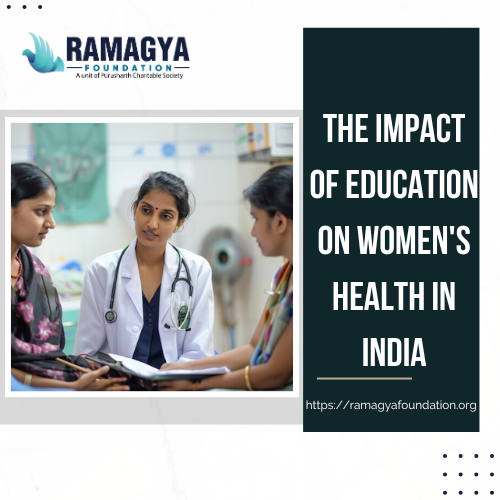In India, female health in India is closely linked to their education level. This ties up the crucial importance of women’s education in shaping not only the lives of individuals but also how health-related outcomes are shaped by whole communities. Let’s explore how the health for women living in India is affected by their education and consider the positive impacts that education has on women’s lives.
Health Status of Women in India
The condition of women’s health in India is different across areas and socioeconomic background.
- Factors like access to health care and sanitation, nutrition, and the way in which women are treated affect women’s health conditions.
- Many women in India are facing health issues because of the disparity in access to the most essential health services as well as education.
- Women from marginalized or rural communities are often the ones to suffer the brunt of these differences. They may not have access to quality medical and prenatal care and this can result in greater rates of mortality among mothers and childbirth complications.
- In addition, conditions like anemia and malnutrition in particular affect girls and women and can affect their overall health and productivity. All of this happens because they do not have proper education as to how to take care of themselves when they face such health issues.
Women Education and Its Impact on Health
- Women’s education is now an influential factor in health. Women with higher education levels tend to make informed choices about their health as well as the health of their family members.
- They are more likely to be more fertile as well as better maternal health and higher rates of vaccination in their infants.
- Women are empowered by education to access timely medical attention and understand the importance of preventive health practices and manage chronic illnesses efficiently.
- Women with a low level of education are often faced with difficulties accessing healthcare. They may not have the right information about the importance of nutrition, reproductive health and prevention of disease, which leads to worse results in terms of health.
- Furthermore, the social norms and economic limitations may hinder how they prioritize health care needs.
Education and Women Empowerment
- Women education is an opportunity for women to be empowered across a range of fields. If women are educated they have a greater chance of participating in the decision-making process within their communities and families.
- They are more confident to question harmful customs and fight to protect their right, such as the right to access health care.
- Women will be empowered by education to contribute to the growth of the economy. If they’re better equipped to get formal employment or start businesses, they can also contribute to the income of their families.
This empowerment of the economy is not only beneficial to their own wellbeing but also improves the socio-economic status of their families and communities.
Challenges Faced by Women in India
Although women education has many advantages, many issues remain in ensuring that everyone has access to high-quality training for females in India:
- Gender bias in education: Deep-rooted societal norms typically prioritize boys’ education over girls’ education, which results in lower enrollment rates and higher rates of dropout for girls, especially in rural areas.
- Financial Constraints: Families struggle to cover expenses for education, such as fees for school, uniforms and transportation, especially for girls.
- The lack of infrastructure: Some regions lack adequate educational facilities and schools which makes the process difficult for females to get access to high-quality education near their home.
Initiatives and Solutions
To address these issues and improve women’s health by education, several initiatives are being developed:
- Programmes of the Government: Programs such as the Beti Bachao Beti Padhao (Save the Daughter, Educate the Daughter) are designed to boost girls’ participation and retention in schools.
- NGO’s Efforts: Non-governmental organizations offer scholarships or mentoring programs as well as vocational training for girls to help with their education and development of skills.
- Participation in the Community: Local communities are mobilising to increase awareness of how important girls’ education is as well as to combat gender stereotypes that limit girls’ access to education.
Conclusion
In the end, education plays a crucial part in improving women’s health in India. Promoting education for women allows women to live healthier lives, give more to their communities and end the cycle of poor health and poverty. The importance of investing in girls’ education isn’t only an issue of social justice. It is an essential factor in creating sustainable development and growth that is inclusive.
In our quest to create the day when all women in India can access quality health and education. Let us not forget that empowerment of women through education isn’t just an obligation of morality, but also an opportunity to create a healthier and more prosperous community for everyone.
By focusing on women’s health and education it is possible to create an India where every woman is empowered, aided by knowledge and supported by fair opportunities to grow and develop.
